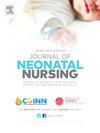Effect of gentle human touch and oral sucrose on distress relief in preterm neonates: A randomized crossover controlled trial
Q2 Nursing
引用次数: 0
Abstract
Purpose
This study was conducted with the aim of comparing gentle human touch and oral sucrose on the distress caused by the placement of a oral-gastric tube in preterm infants admitted to the NICU.
Methods
This prospective randomized crossover controlled trial was performed between June to December 2023 in Tehran, Iran.
Results
The results showed that, at the baseline, there was not statistically significant difference between the mean distress score of participations in the control condition, gentle human touch condition and the sucrose condition (P = 0.139) but after the intervention, the mean distress score in the gentle human touch was significantly lower than the control and sucrose conditions (P < 0.001) and there was not statistically significant difference between the control and sucrose conditions (P = 0.651).
Conclusion
The findings of this study showed that gentle human touch is more effective and more sustained than oral sucrose in reducing the distress of preterm infants.
Trial registration
This study is registered in Iranian Registry of Clinical Trials (https://en.irct.ir/) with IRCTID: 20230202057303N1 on 2023-04-06.
轻柔的人体抚触和口服蔗糖对缓解早产新生儿痛苦的影响:随机交叉对照试验
目的 本研究旨在比较温柔的人体抚触和口服蔗糖对新生儿重症监护室早产儿因插胃管而产生的痛苦的影响。方法 2023 年 6 月至 12 月在伊朗德黑兰进行了这项前瞻性随机交叉对照试验。139),但在干预后,温柔的人类抚触的平均痛苦评分明显低于对照组和蔗糖组(P <0.001),而对照组和蔗糖组之间的差异无统计学意义(P = 0.651)。结论本研究结果表明,在减少早产儿痛苦方面,温柔的人类抚触比口服蔗糖更有效、更持久。试验注册本研究已在伊朗临床试验注册中心(https://en.irct.ir/)注册,注册号为 IRCTID:20230202057303N1,日期为 2023-04-06。
本文章由计算机程序翻译,如有差异,请以英文原文为准。
求助全文
约1分钟内获得全文
求助全文
来源期刊

Journal of Neonatal Nursing
Nursing-Pediatrics
CiteScore
2.00
自引率
0.00%
发文量
143
期刊介绍:
Aims & Scope: This is the practical, bimonthly, research-based journal for all professionals concerned with the care of neonates and their families, both in hospital and the community. It aims to support the development of the essential practice, management, education and health promotion skills required by these professionals. The JNN will provide a forum for the exchange of ideas and information between the range of professionals working in this field; promote cooperation between these professionals; facilitate partnership care with families; provide information and informed opinion; promote innovation and change in the care of neonates and their families; and provide an education resource for this important rapidly developing field.
 求助内容:
求助内容: 应助结果提醒方式:
应助结果提醒方式:


